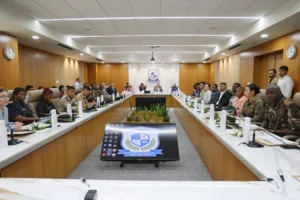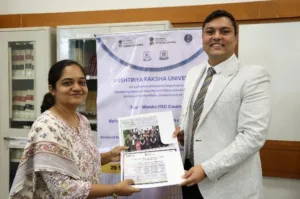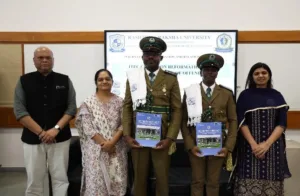India Leads In Offender Reformation And Rehabilitation
Newz Daddy Educational Updates
The School of Behavioural Sciences and Forensic Investigations (SBSFI), in collaboration with the International Cooperation and Relations Branch (ICRB) of Rashtriya Raksha University (RRU), successfully concluded the International Training Programme on Offender Reformation and Rehabilitation. The two-week programme brought together 23 participants from 15 countries, reaffirming RRU’s global commitment to promoting correctional excellence and international collaboration in criminal justice reform. 
This initiative aligns with India’s growing role in global correctional and legal education. RRU is India’s first National Security and Police University and has gained recognition for its advanced programmes in criminology, psychology, and law enforcement. The focus on Offender Reformation and Rehabilitation shows India’s commitment to evidence-based, humane approaches to justice. Many countries are now exploring alternatives to purely punitive systems, focusing more on reform and reintegration.
The inaugural session featured Dr K. L. N. Rao, Director General of Police, Gujarat, who shared his extensive experience in correctional administration. Emphasising that “all saints have a past and sinners have a future,” he illustrated how small yet meaningful reforms can create lasting impact. Drawing from initiatives in Gujarat Prisons, such as improving nutritional standards to enhance inmate health and reduce medical expenses, he highlighted that while a small proportion of offenders adopt crime as a profession, the majority can be positively transformed through guided reformative efforts. His insights, drawn from his book “Gujarat Police X Factor,” set an inspiring tone for the training.
Gujarat has introduced several prison reforms over the years, such as skill development workshops, literacy programmes, and improved healthcare for inmates. These efforts mirror global trends where rehabilitation—rather than only punishment—has shown better outcomes in reducing reoffending rates. Simple interventions, like improved nutrition and hygiene, can have large impacts on inmate behaviour and well-being.
The first lecture was delivered by Dr S. L. Vaya, Lifetime Professor, RRU, a pioneer of Forensic Psychology in India, who laid the conceptual foundation for the training. She emphasised the psychological underpinnings of criminal behaviour and the importance of integrating scientific psychological methods with humane correctional practices to bring about sustainable change in offenders. Her lecture established a strong academic base for the sessions that followed.
Dr Vaya has been instrumental in developing India’s forensic psychology practices, including lie detection methods and behavioural profiling. Her work has shaped how Indian law enforcement approaches criminal investigation and rehabilitation. The focus on understanding behaviour scientifically is a major shift from older, more punitive correctional models.
The training sessions offered a structured exploration of the process from reformation to rehabilitation through expert-led lectures and interactive discussions. Participants examined the holistic purpose of the criminal justice system, focusing on psychological well-being, empathy, anger and stress management, and emotional intelligence as key components of behavioural change. The sessions progressed to topics such as effective communication, conflict resolution, ethical decision-making, and the role of education, vocational training, probation, and parole in the reintegration process. Later discussions addressed the protection of human rights and dignity, relapse prevention through healthy lifestyles, and the restoration of family and community ties as a basis for reintegration. The training concluded with themes on financial literacy, self-reliance, and designing sustainable rehabilitation pathways.
Globally, many successful rehabilitation models focus on exactly these areas. Scandinavian countries like Norway have famously low recidivism rates because they stress education, emotional health, and community reintegration. Financial literacy and self-reliance programmes are increasingly viewed as essential for long-term rehabilitation, as they give ex-offenders tools to rebuild their lives.
To bridge theory with practice, field visits to Sabarmati and Vadodara Central Prisons were scheduled at the end of the programme. This sequence allowed participants to first develop conceptual understanding and then observe reformation and rehabilitation models being implemented within real correctional settings.
Sabarmati Central Jail is one of Gujarat’s oldest prisons, but it has been part of several pilot programmes on inmate education and skill training. Similarly, Vadodara Central Prison has introduced yoga sessions, counselling, and vocational courses. Such field visits give international participants a chance to observe how theoretical concepts are put into daily practice inside prisons.
The valedictory session marked the successful culmination of the programme. All participants were awarded certificates of completion and shared their reflections on the training, commending its academic depth and practical orientation. They expressed sincere appreciation for RRU’s evidence-based approach to offender rehabilitation and conveyed keen interest in establishing future collaborations with India in behavioural sciences and correctional reforms.
International collaborations in criminal justice training are rising. Countries often send correctional officers, psychologists, and legal professionals abroad to learn new models. RRU’s growing role shows India is becoming a global knowledge hub in rehabilitation and behavioural sciences.
Under the visionary leadership of Prof (Dr.) Bimal N. Patel, Vice-Chancellor, Rashtriya Raksha University, continues to strengthen its position as a global centre for education, research, and capacity building in behavioural sciences, criminology, and correctional studies—contributing to a more just, humane, and rehabilitative global society.
Prof. Patel has previously served as India’s representative to the UN International Law Commission, and under his leadership, RRU has expanded its international outreach significantly. The focus on Offender Reformation and Rehabilitation reflects RRU’s long-term strategy to influence global correctional systems through education and research.
Must Read:
RRU Opens Doors To NSG Delegation For Joint Projects
RRU Hosts Powerful World Investor Awareness Week






